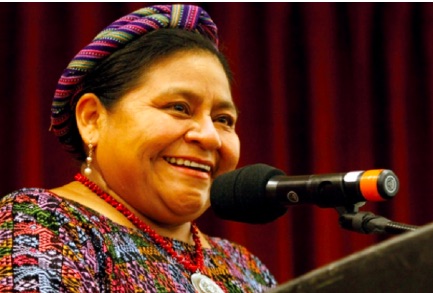FREE FLOW OF INFORMATION .
An article from RCN Televisión (translation by CPNN)
Guatemalan peace nobel laureate Rigoberta Menchú has asked the government of President Iván Duque to strengthen the peace agreement, which was signed with the FARC guerrillas in November 2016.
“There must be much more investment in building a culture of peace, an education for peace,” said Menchu, who participates in Cartagena in the Women Economic Forum (WEF) that began on Thursday [August 1] and concludes on Saturday.

PHOTO: Rigoberta Menchur
Menchu said that this is vital because “surely all common citizens recognize not only the historical importance of the peace agreement but also the importance of its implementation.”
In that sense, she stressed the importance that both former guerrillas and state actors “really have the guarantee of building a new perspective without war and with the possibility of a better life, that is, a decent life from the economic, political, social and cultural point of view. ”
The winner of the Prince of Asturias Award for International Cooperation in 1998 also highlighted the need to make visible the achievements made in the implementation of the agreement because she believes that this is essential in order to “take stock”.
(Continued in right column)
(Click here for the original Spanish version of this article.)
What is happening in Colombia, Is peace possible?
Where in the world can we find good leadership today?
(Continued from left column)
“Humanity would like to see those achievements.”
Menchu also referred to the murder of social leaders and former FARC guerrillas and said that as long as there is impunity “it is very difficult to achieve absolute respect for a peace process.”
“A tremendous effort must be made not only to enforce peace agreements but also to enforce criminal justice,” she said.
In Colombia at least 462 social leaders and human rights defenders were murdered between January 1, 2016 and February 28 of this year, according to data from the Ombudsman’s Office.
Likewise, a study by the NGO Institute for Peace and Development Studies (Indepaz) and the political movement Patriotic March maintains that more than 700 social leaders and 135 ex-combatants of the FARC have been killed since 2016, the year in which the peace agreement was signed.
In addition, the NGO Somos Defensores has reported that the murders of defenders increased almost 50% in 2018, and the crimes were not punished, since in three out of four cases the authorship of the crime was not even established.
Menchú recalled that in Guatemala after signing a peace agreement in December 1996 between the Government of the then President Álvaro Arzú and the Guatemalan National Revolutionary Unit, “an enormous effort was made to persuade the courts to file complaints.”
“We were aware that the subsequent violence had to be prevented, persecution had to be prevented and many times the state security forces or the war actors themselves do it,” he said.
In a press conference prior to her speech at the Cartagena forum, Menchú also said that women should have specific courts to try crimes and aggressions suffered by women.
“We women should consider ourselves as powerful. If that becomes our way of thinking, it will strengthen the actions we do and our actions will be transformative,” concluded Menchu.